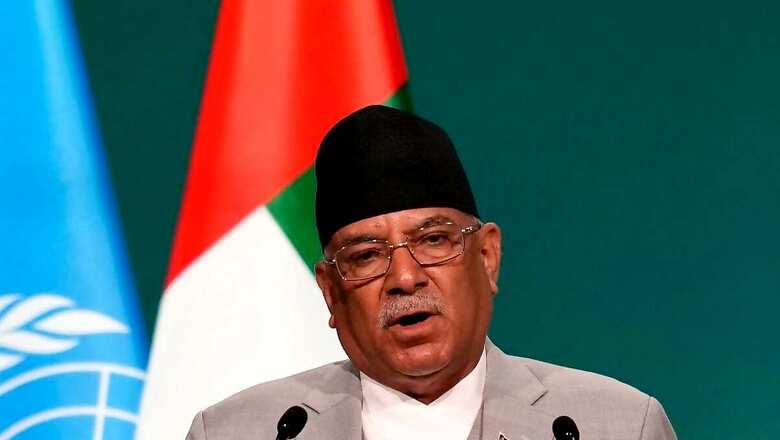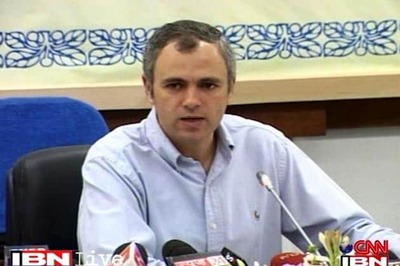
views
Nepal’s Prime Minister Pushpa Kamal Dahal ‘Prachanda’ on Tuesday failed to reach a consensus with allies on a power-sharing deal as their talks ended inconclusively, giving rise to speculation about the stability of his government following his dramatic move to terminate alliance with the Nepali Congress.
Prachanda, a former guerilla leader, forged a new alliance with the Communist Party of Nepal (Unified Marxist-Leninist) – the second-biggest party – led by former premier KP Sharma Oli on Monday following which three ministers took the oath of office.
As the power-sharing deal among the members of the ruling alliance could not be materialised, Prime Minister Prachanda’ failed to expand his cabinet even 24 hours after the new alliance government was formed, sources said.
Prime Minister Prachanda has kept 25 ministerial portfolios including those of Home, Defence, Foreign Affairs and Finance with himself as he hurriedly reshuffled the cabinet with the support of CPN-UML and appointed three ministers without portfolio. Padam Giri from the CPN-UML, Hit Bahadur Tamang from CPN (Maoist Center) and Dol Prasad Aryal from Rastriya Swatantra Party (RSP) took the oath of office and secrecy on Monday.
The cabinet expansion is expected to be completed by Wednesday as discussions were underway among the alliance members till Tuesday evening, Bishnu Rijal, central member of CPN-UML, told PTI.
The talks held among Prime Minister Prachanda, UML chairman Oli, Janata Samajwadi Party chief Upendra Yadav and Rashtriya Swatantra Party president Ravi Lamichhane regarding the power-sharing deal and cabinet expansion ended inconclusively.
The four parties have a combined strength of 142 seats, which is sufficient to show a simple majority, said Rijal.
However, we are also trying to include other smaller parties including CPN-Unified Socialist (10) led by Madhav Nepal, Loktantrik Samajwadi Party (4) led by Mahantha Thakur and Janamat Party (6) led by C.K Raut, in the alliance to get a comfortable majority, he said.
The CPN-US, LSP and Janamat have a combined strength of 20 seats. The UML and RSP both have claimed the portfolio of Home, sources close to the ruling alliance said. Similarly, within the Maoist Centre, both senior leaders Narayankaji Shrestha and Barshaman Pun are claiming the portfolio of Finance. Similarly, Upendra Yadav, chief of JSP is also vying for the coveted Foreign Ministry portfolio. Prime Minister Prachanda is now having a tough time bargaining and satisfying his alliance members in a bid to give stability to the new alliance.
Meanwhile, the Nepali Congress has decided to withdraw its support to the Prachanda-led government, party vice-president Dhanraj Gurung said after a meeting of the NC’s central work execution committee on Tuesday. The meeting concluded that the party will play the role of constructive opposition, said Gurung.
As a key member of the previous ruling alliance, NC withdrew its support to the Prime Minister. Now he must take a vote of confidence to prove his majority in the 275-member lower house, said senior advocate Dinesh Tripathi. After the change in coalition, the prime minister must take a vote of confidence in the parliament within 30 days.
The Maoist Centre led by Prachanda and the Sher Bahadur Deuba-led Nepali Congress was terminated as the growing differences between the two top leaders reached a climax, a CPN-Maoist Centre party leader said. Prachanda became the prime minister for the third term with the support of the Nepali Congress on December 25, 2022. His party is the third-largest group in the House of Representatives.
After breaking the alliance with the Nepali Congress –the largest party in the House of Representatives– Prachanda joined hands with Oli, who was regarded as Prachanda’s top critic. Last year, the CPN-UML withdrew its support to the Prachanda-led government following a rift over backing the main opposition party’s candidate for the presidential poll.
The new political equation formed by keeping the largest party and the strongest democratic force – Nepali Congress – out of power and bringing together the two largest communist forces may not be in the interest of India, according to senior journalist and political analyst Dhruva Hari Adhikary. The frequent changes in coalition government lead to political instability, which is not in favour of the neighbouring countries, Adhikary said. Nepal has witnessed 13 governments in the last 16 years.
Nepali Congress emerged as the largest party in the House of Representatives during the November 2022 general election, securing 89 seats out of a total of 275. The CPN-UML secured 78 seats, followed by the Maoist Centre, which got 32 seats.
The RSP, Rastriya Prajatantra Party, Janata Samajwadi Party and CPN-Unified Socialist won 20, 14, 12 and 10 seats respectively. A party must win the support of at least 138 members of the House of Representatives to form the government. In the 2017 election, Prachanda and Oli merged their parties and secured the majority. Oli became the prime minister, but their partnership ended halfway following differences between them.




















Comments
0 comment